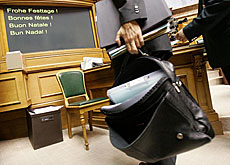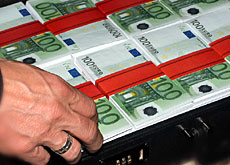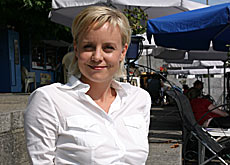Transparency points the finger at party funding

Transparency International, which combats corruption worldwide, says political party funding in Switzerland is among the "murkiest" in Europe.
And it highlights that not one of the major parties has come up with plans to increase the transparency of money in the political system, despite a donations scandal in 2004.
In its annual report published on Wednesday, Transparency left no doubt that there was room for improvement in a political system that was basically voluntary and unpaid.
“Swiss politicians have to finance their own election campaigns,” Anne Schwöbel, managing director of Transparency International Switzerland, told swissinfo.
“The problem is that they do not have to declare who sponsors them, and we do not know the amount by which they are supported. This makes the whole system not very transparent.”
First step
The report’s authors also found that a law introduced in December 2003 on possible conflicts of interest of parliamentarians did not go far enough since it did not address the issue of parliamentary sponsorship.
Schwöbel said that Transparency applauded the fact that this law was introduced as a first step towards more clarity within the system.
But she explained that the law did not prevent a donation scandal of 2004, which implicated two Social Democratic parliamentarians, Anita Fetz and Roberto Zanetti.
They did not declare their membership of the board of directors of Pro Facile, a foundation that runs investments.
This left them open to disciplinary action because the foundation had been applying controversial methods developed by Swiss financier Dieter Behring to the “donations” it received.
Behring was arrested in October 2004 on suspicion of investment fraud involving hundreds of millions of francs.
Re-election campaign
Behring had allegedly been a major backer of Fetz’s political ambitions, giving large sums to her re-election campaign.
“To avoid this kind of scandal we should think about another approach… It could be that they should declare their sources or maybe we should analyse where the loopholes are to find another system that would make things more transparent,” Schwöbel said.
The report also noted that, despite the damage caused in the wake of the scandal, not one of the major parties came up with proposals to increase the transparency of private money in the political system.
“The parties did not react and I feel the reason is that they [themselves] need financial support and they need their sources [of money].”
“Maybe they fear that if they have to declare who these are and what the exact amounts are that they will lose their sponsors.
swissinfo, Robert Brookes
Transparency International is the leading non-governmental organisation devoted to combating corruption
With an international secretariat in Berlin and more than 85 national chapters, it works to curb the supply and demand of corrupt practices.
It says its purpose is not to expose individual cases of corruption but more to focus on prevention reforming systems.
The Transparency International report explains that:
Parties do not benefit from government funding, apart from small contributions to party factions, and politicians work on a voluntary basis, while supporting themselves through other jobs.
Initiatives to make parliament more professional have floundered because of the opinion that politicians choose their profession through conviction, rather than for financial gain.

In compliance with the JTI standards
More: SWI swissinfo.ch certified by the Journalism Trust Initiative










You can find an overview of ongoing debates with our journalists here . Please join us!
If you want to start a conversation about a topic raised in this article or want to report factual errors, email us at english@swissinfo.ch.